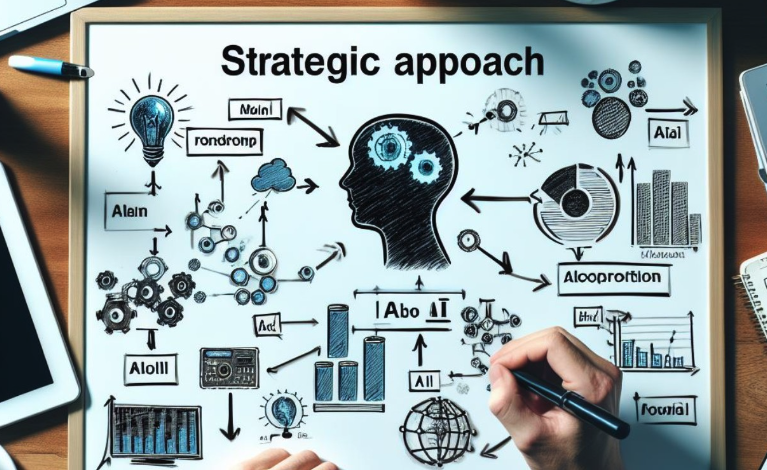
Make no mistake, we are moving into a new era of technological advancement; as we transition, it becomes crucial to understand that embracing digital transformation is more than just adopting new technologies. It goes beyond rushing to sign up for the latest AI product released. It involves a careful reevaluation of how an organization operates, competes, and creates value.
Drawing upon my experience in spearheading technology-driven initiatives, I’ve come to appreciate the pivotal role of Artificial Intelligence (AI) in this transformative journey. AI can be an invaluable partner in propelling digital transformation ambitions forward. However, in the journey of innovation, failures are inevitable. Embrace them as stepping-stones to success. A strategic and resilient adoption approach is paramount to harness AI’s potential effectively. Prepare for setbacks, learn from them, and forge ahead with a clear vision of your digital transformation goals.
The Integral Role of AI in Digital Transformation
AI is more than just a buzzword; it’s a force reshaping the competitive landscape across industries. McKinsey research suggests 30% of work hours could be automated by 2030 (Kinoti, 2024). The impact of AI goes beyond automation, weaving through the intricate threads of business operations, customer engagements, and strategic decision-making.
Take, for example, its application in manufacturing, where AI optimizes inventory management systems, enhancing efficiency and minimizing errors. By harnessing sophisticated data analytics, companies can elevate their decision-making processes and gain invaluable insights through data visualization (Edyta Golqb-Andrzejak, 2023). In my experience, AI has proven to be a powerful change agent. By harnessing AI’s capabilities, businesses can adapt to the ever-evolving digital landscape and become leaders in their respective fields.
Modernizing Corporate Systems with AI
AI’s prowess in processing extensive data at unparalleled speeds has revolutionized decision-making. My involvement in enhancing enterprise-wide technology solutions with AI has markedly boosted operational efficiency and innovation. Integrating AI within our foundational systems allowed us to automate intricate workflows, forecast market trends with enhanced precision, and deliver personalized customer experiences on a large scale, showcasing AI’s transformative impact on corporate ecosystems. The potential efficiency gains from AI are
profound. Utilizing machine learning algorithms and data analytics, organizations can uncover operational inefficiencies and pinpoint improvement areas (Saeed et al., 2023). One such area is fraud detection/risk management. Fraudulent activities pose a significant threat to organizations across various sectors. According to Allen (2024), GenAI can improve fraud detection capabilities when placed at the center of a risk management strategy.
Revolutionizing Customer Experiences
AI’s most notable contribution to digital transformation might be its ability to revolutionize customer experiences. Leveraging AI enables businesses to offer personalized recommendations, instant support via chatbots, and seamless user interfaces that preempt customer needs. Our development of AI-driven solutions has underscored the transformative potential of placing AI at the center of customer experience strategies, unlocking improved customer satisfaction and loyalty levels.
AI’s capabilities to personalize experiences, enhance customer support, and optimize customer journeys are impressive. However, AI cannot exist in a vacuum; it needs you, the human, in the loop to be successful. The “Human-in-the-Loop” (HITL) concept is a crucial approach that integrates human intelligence and interaction with machine learning systems to enhance performance, accuracy, and decision-making processes. HITL enhances accuracy by integrating human expertise to correct errors, validate algorithms, and ensure precision in critical applications like manufacturing or regulatory compliance.
Assessing Organizational Readiness
The journey toward AI integration begins with thoroughly assessing an organization’s readiness and examining existing technology infrastructure, data management practices, and workforce skills. Evaluating technological preparedness is pivotal in identifying infrastructure and data management gaps that are crucial for effective AI leveraging. Furthermore, organizational culture significantly influences AI adoption. Cultivating a culture that embraces change, prioritizes data-driven decisions, and fosters continuous learning is essential. Leaders must lead by example in AI initiatives, showcasing a commitment to harnessing AI for strategic advantage.
Building a Competent Team
Forming a proficient team with expertise in AI, machine learning, data analytics, and industry-specific knowledge is crucial for successful adoption. Investing in training, fostering innovation, and collaborating with external experts can enhance team capabilities and accelerate AI initiatives.
Strategies for Effective Team Building and Skill Development
· Pinpoint the specific roles and skills needed for AI projects, including data scientists, AI engineers, data engineers, and domain experts.
· Invest in Training: Upskill your workforce through partnerships with educational institutions or online platforms to equip your team with AI and data analytics skills.
· Foster a Culture of Innovation: Encourage experimentation and learning from failures to cultivate an innovative atmosphere.
· Collaborate with External Experts: Engaging with external AI specialists can offer fresh perspectives and accelerate AI initiatives.
The cornerstone of AI-driven transformation is the formation of a proficient team adept in AI and machine learning, data analytics, and industry-specific knowledge. Assembling a multidisciplinary team that not only possesses technical expertise but also a deep understanding of business needs and customer needs is instrumental in successful adoption.
Integrating AI into Corporate Systems
Integrating AI into corporate systems demands strategic planning, alignment, and technical precision. It starts with identifying where AI can deliver the most impact, focusing on inefficiencies, bottlenecks, or decision-making enhancement opportunities. My work involves continually analyzing operational processes to pinpoint where AI could significantly improve efficiency and outcomes.
Developing and deploying AI solutions requires selecting appropriate technologies, customizing AI models, and ensuring seamless integration with current systems. This involves collaborating with data scientists, IT professionals, and domain experts to develop models tailored to specific organizational needs and ensure AI systems harmonize with existing infrastructures.
Tips for AI Integration
· Start small and scale: Pilot projects help refine your approach before wider implementation.
· Focus on data quality: The success of AI hinges on the quality of data it processes.
· Prioritize data cleansing and establish data governance practices.
· Address ethical and privacy concerns: Implement AI responsibly, considering ethical implications and data privacy regulations.
· Embrace failure: Accept that some efforts may not succeed. Learn from these experiences and move forward.
The digital landscape is quickly evolving. Companies that fail to adapt risk being left behind. While the allure of the latest tech trends is undeniable, true digital transformation demands a more strategic approach. It necessitates fundamentally reevaluating how an organization operates, competes, and creates value. Artificial Intelligence (AI) has emerged as a powerful tool in this transformation journey, potentially propelling businesses forward.
By strategically adopting a comprehensive approach, organizations can navigate this journey successfully, paving the way for a more efficient, innovative, and boundless future while keeping the human-in-the-loop. Through my firsthand experiences spearheading tech-driven ventures, I’ve witnessed the game-changing prowess of Artificial Intelligence (AI). AI isn’t just a tool; it’s a transformative force that can turbocharge digital evolution.





